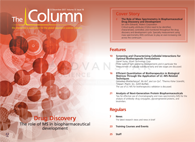LCGC Europe/HTC-15 Innovation Award
The LCGC Europe/HTC-15 Innovation Award was launched to celebrate the work of scientists who are innovatively evolving the field of hyphenated techniques.
The LCGC Europe/HTC-15 Innovation Award was launched to celebrate the work of scientists who are innovatively evolving the field of hyphenated techniques. The winner of the award will present their research at the HTC-15 conference, which will be held in Cardiff at the Cardiff City Hall from 24–26 January 2018. The winner will receive a plaque and a 1000 Euro travel grant award and free registration to the conference and social programme.
The winner will be selected by the HTC scientific committee who will choose the winner based on the following criteria:
- The winner has made an innovative contribution to the field of separation science by introducing new methodologies, new instrumentation, or new techniques in the field with a strong focus on applicability.
- The scientist is under 45 years of age.
For 2018, the HTC conference series has moved from Ghent in Belgium to Cardiff in the UK. The meeting is organized by the Royal Society of Chemistry Separation Science Group together with the Royal Flemish Chemical Society. The programme includes topics such as Big Data, Fundamentals and Exploiting Separation Science, (R)evolutions in Biopharmaceutical Analysis, Food and Drink, Environmental, Comprehensive Chromatography, and many more. The next edition of the HTC conference will be held once more in Belgium

New TRC Facility Accelerates Innovation and Delivery
April 25th 2025We’ve expanded our capabilities with a state-of-the-art, 200,000 sq ft TRC facility in Toronto, completed in 2024 and staffed by over 100 PhD- and MSc-level scientists. This investment enables the development of more innovative compounds, a broader catalogue and custom offering, and streamlined operations for faster delivery. • Our extensive range of over 100,000 high-quality research chemicals—including APIs, metabolites, and impurities in both native and stable isotope-labelled forms—provides essential tools for uncovering molecular disease mechanisms and exploring new opportunities for therapeutic intervention.
New Guide: Characterising Impurity Standards – What Defines “Good Enough?”
April 25th 2025Impurity reference standards (IRSs) are essential for accurately identifying and quantifying impurities in pharmaceutical development and manufacturing. Yet, with limited regulatory guidance on how much characterisation is truly required for different applications, selecting the right standard can be challenging. To help, LGC has developed a new interactive multimedia guide, packed with expert insights to support your decision-making and give you greater confidence when choosing the right IRS for your specific needs.

.png&w=3840&q=75)

.png&w=3840&q=75)



.png&w=3840&q=75)



.png&w=3840&q=75)










